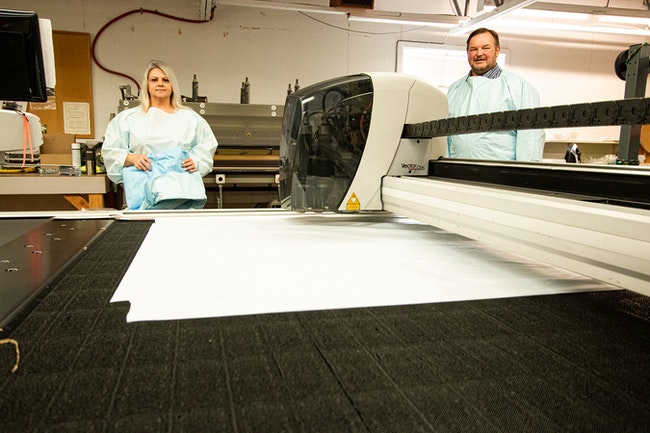 Nadia Kifyak and Russ Monk, managers at WaterShed, Inc., try on new medical gowns that their company has recently begun producing in response to the shortage of personal protective equipment. (Caleb Wolf/Salem Reporter)
Nadia Kifyak and Russ Monk, managers at WaterShed, Inc., try on new medical gowns that their company has recently begun producing in response to the shortage of personal protective equipment. (Caleb Wolf/Salem Reporter)
NOTE: Salem Reporter is providing free access to its content related to the coronavirus as a community service. Subscriptions are vital to continue this so please sign up today.
Hospitals across the country have faced a dire shortage of gloves, makes, gowns and other personal protective equipment during the COVID-19 outbreak.
But Salem Health has found a partial solution in its own backyard.
After hearing about the shortages of personal protective equipment, Russ Monk, operations director for WaterShed, Inc. began looking for ways the company could retool its operations to help out with the shortage. The 35-year-old company makes raingear and outerwear for police, fire, military personnel and industrial workers. With the COVID-19 outbreak, he said that the frontline responders are now doctors, nurses and other health care workers. The company has pivoted to manufacturing medical gowns to help address shortages.
“Protecting our frontline people is what we do,” said Monk, standing in the company’s headquarters in Northeast Salem, a building peppered with signs reminding employees to maintain social distancing.
Monk reached out to state Rep. Paul Evans, a Monmouth Democrat who chairs the House Committee on Veterans and Emergency Preparedness. Evans said in an email he helped put him in touch with Salem Health to get the company manufacturing needed personal protective equipment.
The result is a homegrown medical gown that’s designed to prevent health care workers from being exposed to the coronavirus.
Karl Wright, director of supply chain services for Salem Health, said that Monk, whose two sons were born at Salem Health, approached the health care provider with a real desire to help. After some initial discussion, Monk presented Salem Health with a prototype of the gown.
“We looked at it and thought, ‘hey, this could be a winner,’” said Wright. He shared it with the hospital’s chief medical officer and lead nurses who agreed.
The hospital ordered an initial 25,000 gowns and will follow up with another order of 100,000, said Wright. He described the gowns as being reasonably priced at under $2 apiece.
Wright said that a good gown needs to be impervious to prevent fluids or droplets from landing on a health care worker’s clothing or skin, which could cause them to contract the virus or spread it elsewhere. He said it also needs to be breathable, similar to the Gortex jackets that WaterShed makes.
Monk credited Dr. Lloyd Hiebert, a retired anesthesiologist, who worked with the company to direct it to the right material supply and ensure that the gowns were properly designed for a medical setting.
In a room in Watershed’s production facility lined with rolls of fabric, Monk described how the gowns will be made. The light polypropylene fabric will glide across an air hockey-like surface to a production table. There, a computerized system will use an inches-long vibrating blade, Monk likened to a miniature samurai sword, to cut the layers of fabric into the gowns. From there the gowns, lined with felt, will be heat sealed rather than sewn.
“Each one of those holes is a place bugs can get into,” said Monk.
Monk said the company will start reaching out to other area hospitals but doesn’t have plans to get into producing masks or gloves.
The gowns are just one part of solving the crisis around personal protective equipment.
Wright said that during the outbreak, the hospital uses around 1,500 gowns a day, a number that’s at risk of climbing back up. He said it also uses up to 3,000 regular medical masks daily as well as up to 800 n95 respirator masks.
Manufacturers of personal protective equipment have relied on supply chains from overseas, which have been disrupted during the outbreak. Since then, reports have emerged of health care workers having to reuse equipment or improvise by wearing goggles or wrapping their feet in trash bags.
“The national supply chain for healthcare, I believe, it’s been in bad shape for quite a while,” said Wright. “And you have an event like this and it raises its ugly head.”
With supply chains disrupted, there are efforts to make personal protective equipment closer to home. The situation has prompted Nike to get into the business of making personal protective equipment. Salem Health has also appealed to the community to help sew protective masks, which drew an overwhelming response.
Wright said he’s grateful for all the community support.
“I can’t tell you how many people have just really wanted to do everything they can to help us,” he said. “And I wish that I had more things I could send their way.”
Contact reporter Jake Thomas at 503-575-1251 or [email protected] or @jakethomas2009.









